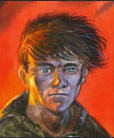Forum
Welcome Guest |
|
|---|---|
 Author Author |
Topic: |
|---|
| Figwit |
|
||||||||
| Aervir |
|
||||||||
| k |
|
||||||||
| gilraen_22 |
|
||||||||
| RubySandybanks |
|
||||||||
| Morwinyoniel |
|
||||||||
| Ithildin55 |
|
||||||||
| RubySandybanks |
|
||||||||
|
|||||||||
| Lieutenant_Gothmog |
|
||||||||
| Members Online |









 5.IX. The Last Debate
5.IX. The Last Debate ) Although Sauron's deeds won't contribute to any greater good (unlike Morgoth's) - at least I think so - he will be overthrown by his own pride and short-sightedness: He places all his trust in the recovery of his One Ring; however, Gandalf apparently implies that Sauron doesn't think about his enemies' wanting to destroy it. No, the Dark Lord assumes that Aragorn will claim it for himself! Evil will be overcome because evil can only produce deceit, cunning, force, and the will for power and domination, but not the willingness to sacrifice anything - and, what is more important, Sauron doesn't recognize that. This view of evil in Tolkien's mythology may be the reason why Sam sees the Shadow only as a passing thing in another passage ( unfortunately, I can't remember where
) Although Sauron's deeds won't contribute to any greater good (unlike Morgoth's) - at least I think so - he will be overthrown by his own pride and short-sightedness: He places all his trust in the recovery of his One Ring; however, Gandalf apparently implies that Sauron doesn't think about his enemies' wanting to destroy it. No, the Dark Lord assumes that Aragorn will claim it for himself! Evil will be overcome because evil can only produce deceit, cunning, force, and the will for power and domination, but not the willingness to sacrifice anything - and, what is more important, Sauron doesn't recognize that. This view of evil in Tolkien's mythology may be the reason why Sam sees the Shadow only as a passing thing in another passage ( unfortunately, I can't remember where  As far as its outcome is concerned, I'm not sure whether the "message" of their decision to walk open-eyed into that trap, with courage, but small hope for themselves is the ultimate "triviality" (a bit like self-help books, you know: just act nobly and do good and everything will turn out just fine
As far as its outcome is concerned, I'm not sure whether the "message" of their decision to walk open-eyed into that trap, with courage, but small hope for themselves is the ultimate "triviality" (a bit like self-help books, you know: just act nobly and do good and everything will turn out just fine 

 I need my brain cells for work too.
I need my brain cells for work too. 